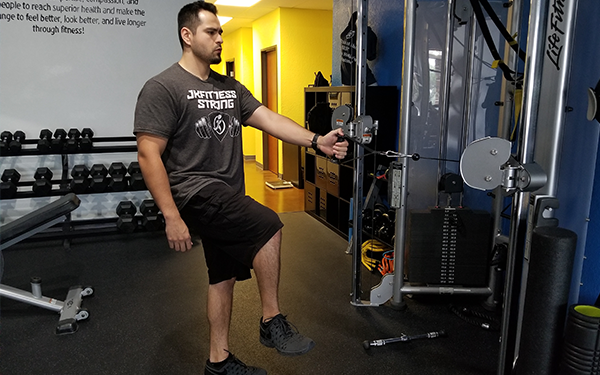You hear it all of the time, “you have to workout every day if you want to lose weight,” unfortunately that’s a fairly general statement and I do not agree with it in its entirety because there are other factors to consider. Losing weight will not require you to workout every day but it will require you to eat less than you currently do and it will require you to get up and off of the couch on a regular basis.
Working out every day has many advantages if you recovery properly, however killing yourself everyday to try and lose two pounds of water weight by the weekend will not do your body any favors in the long run. If it works better for your schedule to workout consistently every other day for a year instead of stressing yourself out to make it to the gym daily, then do what you know you can commit to for the long run. Wouldn’t it be better if you had played a little less but kept yourself in the game? In other words if you workout hard every single day for two weeks and then burn out and skip the gym for the next two weeks, you will have to start all over again. It would have been better for your long-term health if you had cut down on your weekly gym trips and went to the gym regularly for the entire month. Now, if you are the type of person who needs to do something physical everyday or your overwhelmed with guilt from not working out, then try cutting down on the intensity and go for a long walk, a hike, play sports with friends, or do a yoga or mobility flow class a few times a week. These tips will help your body recover on your days outside of the gym and allow you to workout harder when you do go to the gym.
Losing weight is not only impacted by how often you workout but also by your daily nutrition habits. If your goal is to lose weight but you are still eating more than your metabolism requires, then all of the exercise your body can handle will not help you lose weight. Exercise and nutrition go hand in hand and should be used together as tools to help you reach your weight loss goals. Proper nutrition alone can help you effectively manage your weight, and adding in exercise days throughout the week will be a useful tool to create an even bigger caloric deficit, leading to healthy long- term weight management.
The take away point is that you do not have to “workout every day” to lose weight, but you do have to remain consistent with a workout plan for weeks, months, and years if you want to see long term progress. Don’t forget about the role that food consumption plays because fueling your body with the proper nutrition and manipulating the amount of food you consume will directly impact how much weight you lose, or gain for that matter. When you pour too much water into a glass you can see that the extra spills over the sides. The same thing happens to your body when you eat too many calories…you can see the extra turning into body fat.
Consider this, if you exercised twice a week for one hour you would burn an extra 600 calories each week (~300 calories per workout). So, if you workout consistently two times a week for six months, then you burn around 14,400 calories, and since there are 3,500 calories in one pound of fat, in six months you will lose a minimum of four pounds. Now imagine if you stopped drinking your calories how much weight you could lose, sadly most caloric beverages are around 150 calories. Therefore, if you eliminated two drinks per week that saves 300 calories, and if you remain consistent with this new habit for six months that’s a total of 7,200 calories saved- or the equivalent of losing two pounds! If you commit to the simple act of cutting out two drinks per week and working out two times a week for six months you will lose six pounds, but imagine if you did more than the bare minimum.
It’s time to change the way you associate “working out everyday” to mean being active everyday, for example 2-3 days a week you should make time for an intense gym session and the remaining days should be filled with moderate intensity activities like hiking, biking, playing sports, or doing yoga. The key is to not neglect your nutrition and find out what type of exercise works best for your body and your schedule and stick to it week after week! Be persistent and you’ll get it, be consistent and you’ll keep it.
 Article Written by:
Article Written by:
Michael Devon, NASM-CPT
Health and Fitness Professional
JKFITNESS, LLC
www.jk-fit.com






Leave A Comment
You must be logged in to post a comment.